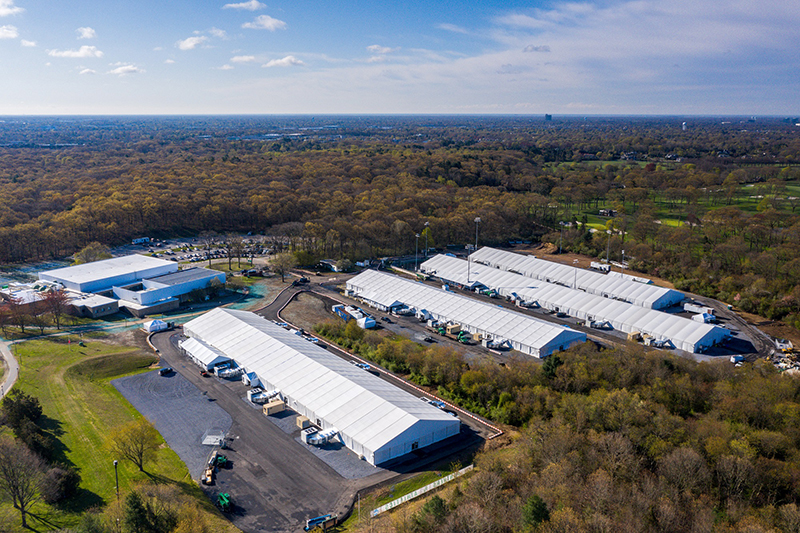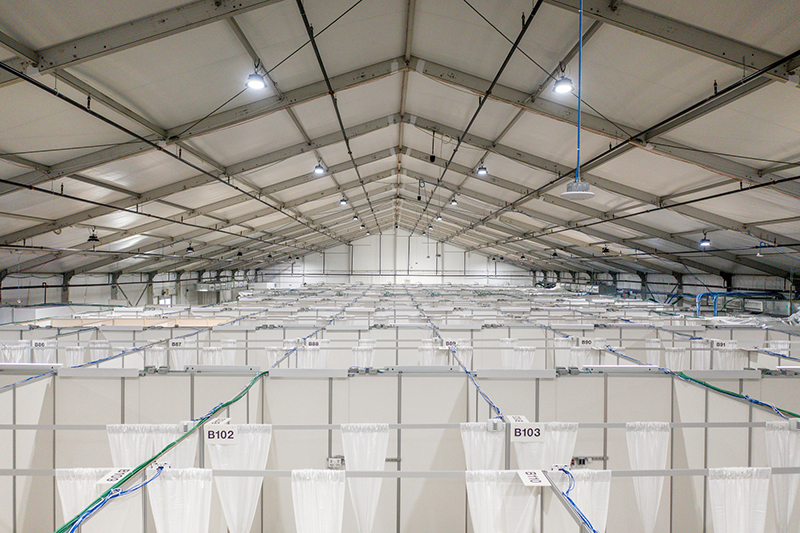JB&B transforms SUNY Old Westbury Gym and Athletic Field into alternate care facility with AECOM and USACE - by Christopher Pell


At the beginning of the COVID-19 pandemic, FEMA tasked the United States Army Corps of Engineers (USACE) with a mission assignment to construct a 1,000-bed alternate care facility (ACF) to provide relief to area hospitals in the event that the pandemic stressed their resources beyond their ability to provide an adequate standard of care to patients. AECOM was awarded a design-build contract and partnered with JB&B for MEP design, commissioning and field services. The primary challenge for USACE and the design and commissioning teams was the requirement that the facility be designed, constructed, tested, and turned over all in the span of 28 days. Over the course of the project, the gym and athletic field at SUNY Old Westbury were transformed from college athletic facilities into a 1,000+ bed ACF that could be activated to fully operational status within 14 days if necessary. The four ACF tents remained in active standby mode through December 2020, at which time decommissioning work began. Today, two tents have been fully decommissioned, including flooring, and two remain partially intact with much of the MEP and nurse station equipment removed. The Clark Center gymnasium has been, and continues to be, used as a COVID mass vaccination site.
While the SUNY Old Westbury ACF project did not implement all of the BCxA best practices or follow the flow and deliverables of a traditional commissioning project, the commissioning and project teams channeled the spirit of the best practices to deliver a complete and successful project within the uncertainties and mounting pressures of a deadly global pandemic.

The aggressive project schedule impelled all team members to approach this mission differently than a conventional construction project. On most construction and commissioning projects, the commissioning provider has the luxury of weeks or months to build relationships with the rest of the construction and commissioning team. In the case of the SUNY Old Westbury ACF, the traditional “forming, storming, and norming” of team-building had to be completed in a matter of hours or at most a couple of days.
To deliver the project on time and to the standards required by USACE, the design team began their work immediately, designing a project based not on preferred vendors and equipment but solely on what equipment could be sourced, built and delivered on time to meet the demanding schedule. The construction team began work concurrently with the design team, and worked around the clock for four weeks to complete the project. Similarly, JB&B field commissioning engineers, testing adjusting and balancing (TAB) technicians and project managers were onsite nearly 24/7 for the duration of the project, working, quite literally, side-by-side with USACE, architects, design engineers, construction managers, equipment manufacturers and trade contractors.
Instead of a traditional commissioning-based design review, the commissioning team provided real-time coordination between the design and construction teams onsite, and helped develop the design into something that was both functional and feasible within the time constraints of the project. Pre-functional performance checklists were replaced on this project with hourly inspections and coordination with installing contractors to address issues before they fully developed. Functional performance testing was performed almost immediately after equipment was powered on and safe to operate, and issues were addressed in the moment. The superior agility, teamwork and determination of the project team ultimately led to completion and turnover to USACE of a successful and fully functional 1,000+ bed ACF—and a mission accomplished for all involved.
In the case of this project, the market served was not a single developer, tenant, client, or end-user; rather, it was the greater good and well-being of all people in the region. The sense of pride, duty, and determination to act in the service of a noble purpose motivated the project and commissioning teams to work together in a way that we may not see again on a project in our lifetime. The commissioning team and the entire project team are extremely proud of their mission accomplished, but are also relieved that to date the facility has not been pressed into active service.
Christopher Pell, ACP, is an associate at Jaros, Baum and Bolles, New York, N.Y.
Suffolk County IDA supports expansion of A&Z Pharmaceuticals


The evolving relationship of environmental consultants and the lending community - by Chuck Merritt
When Environmental Site Assessments (ESA) were first part of commercial real estate risk management, it was the lenders driving this requirement. When a borrower wanted a loan on a property, banks would utilize a list of “Approved Consultants” to order the report on both refinances and purchases.









.jpg)